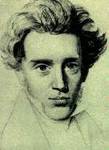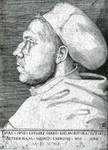
and began his theological career quite sympathetic to Luther . But that opinion underwent a significant change. By the end of his life, as Walter Lowrie wrote, Kierkegaard had "nothing but denunciations" for Luther. The change in Kierkegaard's thinking is discussed in a recent article by Alice von Hildebrand, "Kierkegaard: A Critic of Luther," Latin Mass magazine (Spring, 2004), pp. 10-14. Some of the quotations from Kierkegaard, tracking the shift in his thinking, are posted on my Philosophia Perennis blog. Just a few are offered below to whet your appetite:
-- [S. Kierkegaard] --
"Luther, your responsibility is great indeed, for the closer I look the more clearly do I see that you overthrew the pope and set the public on the throne.... You altered the New Testament concept of 'the martyr,' and taught men to win by numbers."
As for the rest, the closer I examine Luther the more convinced do I become
that he was muddle headed. It is a comfortable kind of reforming which consists in throwing away burdens and making life easier.... True reforming always means to make life more difficult, to lay on burdens; and the true reformer is therefore always put to death as though he were the enemy of mankind. Luther's 'hear me, thou Pope' ... sound[s] to me always disgustingly worldly. Is that the sacred earnestness of a reformer ... who knows that true reformation consists in becoming more inward? Such an expression is just like a journalist's slogan. That unholy political attitude, that desire to overthrow the pope is - [Martin Luther] - what is so confusing about Luther."
"[I]t can come to the point in Protestantism when worldliness is honored and venerated as godliness. And that, I maintain, cannot happen in Catholicism.... No wonder Luther very quickly got such great support. The secular mentality understood immediately the break.... [T]hey grinned in their beards ... at Luther ... that chosen instrument of God who had helped men so splendidly make a fool of God."


No comments:
Post a Comment